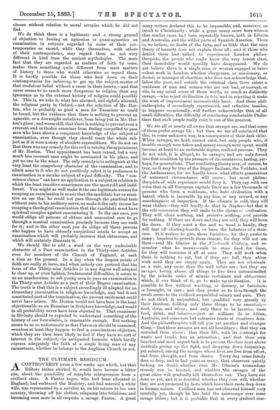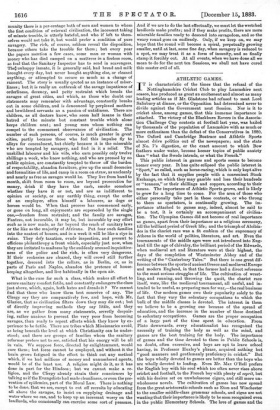THE ULTIMATE RESIDUUM.
ACONTROVERSY arose a few weeks ago which, but that Editors rather shirked it, world have become a bitter one, about the possibility of complete retrogression from a civilised state. A Fantee negro, who had been educated in England, had embraced the Ministry, and had married a white wife, was represented by a novelist as, on his return to his own country, throwing off his clothes, relapsing into fetichism, and becoming once more in all respects a savage Fantee. A great many writers declared this to be impossible, and, moreover, an insult to Christianity ; while a great many more bore witness that similar cases had been repeatedly known, both in Liberia and Australia, and the wilder parts of Spanish America. There is, we believe, no doubt of the facts, and as little that the easy theory of insanity does not explain them all ; and if those who denied them had talked to experienced London philan- thropists, the people who really know the very lowest class, their incredulity would speedily have disappeared. We do not believe there is a single man or woman engaged in bene- volent work in London, whether clergyman, or missionary, or doctor, or manager of charities, who does not acknowledge that, below the poor, and outside the criminal class, there exists a residuum of men and women who are not bad, or corrupt, or vile, in any usual sense of those words, so much as distinctly savage,—who reject civilisation in Coto, and iu rejecting it make the work of improvement inconceivably hard. And these phil- anthropists, if exceedingly experienced, and reflective besides, as happens occasionally, will further acknowledge that of all small difficulties, the difficulty of convincing comfortable Philis- tines that such people really exist is one of the greatest.
We are all or nearly all aware that savages are, and that some of them prefer savage life ; but then we are all convinced that this, in some unknown way, is a consequence of their dark skins. White savages, we hold, cannot exist, but only people who, if trouble enough were taken and money enough were spent, would become, at least to an endurable degree, civilised persons. They do not wish, it is alleged, to be savages, and are only forced into that condition by the pressure of circumstances, lasting, per- haps, for generations. That comforting theory may, of course, be true, as it may be true of the Digger Indians, the Veddahs, and the Andamanese, for we hardly know what effects generations of untoward circumstance will cause ; but most philan- thropists of wide experience would deny it. They say with one voice that in all European capitals there are a few thousands of persons who form a residuum, who hate civilisation with a hatred which is incurable by any fear, or tiny reward, or any searchingness of inspection. If the climate is cold, they will wear clothes—they will hardly do that in Naples—but that is the sole concession they will make to the claims of civilisation. They will clean nothing, and preserve nothing, and provide for nothing. If there are doors and they are cold, they will burn the doors. If they want a fire and no wood is handy, they will tear off skirting-boards, or burn the balusters of a stair- case. It is useless to give them furniture, for they prefer to camp ; hopeless to provide them cloacae, for they will not use them—read Mr. Glazier in the Nineteenth Century, and re- member what ho means—vain to store food for them, for they will consume it all at once. They will work when there is nothing to eat, but if they are full, they abhor work until they are empty again. They are not criminals as a rule, any more than the wild tribes are ; but they are savages, loving above all things to live lives untrammelled by the infinite series of minute restraints and obligations which, if you think of it, go to make up civilisation. It is possible to live without washing, or decency, or furniture, or foresight, or care ; and they prefer so to live, though the result seems to the civilised unqualified misery and pain. They do not think it unqualified, but qualified very greatly by their freedom, holding only three things to be essential,— food, sleep, and wives ; and only three to be luxuries, more food, drink, and tobacco,—just as millions do in Africa, Australia, and some rare but extensive tracts of Southern Asia. And the philanthropists will tell you yet another and stranger thing,—that these savages are not all hereditary ; that they are recruited from above; that their life, with its contempt for wants and bonds, has an attraction ; and that their own heaviest and most urgent task is to prevent the class next above suddenly giving up the fight, and dropping down despairing, yet relieved, among the savages whose lives are free from effort, and from thought, and from shame. Every day some family does so drop, and in bad years so many, that observers quietly looking on doubt whether even Mr. Glazier's tremendous remedy can be trusted, and whether 'the savages of the great cities will gradually kill themselves out. They have not done so yet, and it is doubtful whether they ever will, whether they are not protected by facts which have their roots deep down in human nature. Civilised man has not observed himself very carefully yet, though he has held the microscope over some savage tribes ; but it is probable that in every civilised eom- munity there is a per-centage both of men and women to whom the first condition of external civilisation, the incessant taking of minute trouble, is utterly hateful, and who if left to them- selves would not take it, but would prefer a condition of pure savagery. The rich, of course, seldom reveal the disposition, because others take the trouble for them ; but every year the papers mention a few cases, some man or woman with money who has died camped on a mattress in a fireless room, so foul that the Sanitary Inspector has to send in scavengers. The unhappy inmate, it is generally said, had bread and milk brought every day, but never bought anything else, or cleaned anything, or attempted to secure so much as a change of raiment. The story is usually quoted as an instance of miser- liness ; but it is really an outbreak of the savage impatience of orderliness, decency, and petty restraint which breeds the savages of great cities, and which, as those who doubt our statements may remember with advantage, constantly breaks out in some children, and is denounced by perplexed mothers and bewildered servants as a passion of untidiness. There are children, as all doctors know, who seem half insane in their hatred of the minute but constant trouble which alone keeps children neat ; and young men whom nothing can compel to the commonest observances of civilisation. The number of such persons, of course, is much greater in great cities, partly because those who feel this impulse fly to alleys for concealment, but chiefly because it is the miserable v ho are tempted by savagery, and find in it a relief. The unskilled labourer and his wife, who earn possibly only twelve shillings a week, who know nothing, and who are pressed by no public opinion, are constantly tempted to throw off the burden of respectability, abandon furniture, give up the small decencies and formalities of life, and camp in a room on straw, as uncleanly and nearly as free as savages would be. They live from hand to month, shift from room to room, are beyond prosecution for money, drink if they have the cash, smoke somehow whether they have it or not, and are as indifferent to opinion or society, or any earthly thing, except the order of an employer, often himself a labourer, as dogs or horses would be. When that process has commenced early, or gone on long, all enjoyments are superseded by the single one,—freedom from restraint; and the family are savages, Fantees, not incurable, it may be, but incurable by any effort such as is now made, as far beyond the reach of sanitary laws or the like as the majority of Africans. Put four such families into the neatest of houses, and in a week it will be like a stye in rains. They defy taxation, evade inspection, and present to officious philanthropy a front which, especially just now, when they are irritated to madness by the suddenly aroused inquisitive. ness of the police and the rich, is often very dangerous. If their rookeries are cleared, they will crowd still further together, descend into the cellars, as in Berlin, or, as in parts of Paris and Naples, abandon the pretence of house- keeping altogether, and live habitually in the open air.
What is the cure for such a class, which makes all effort to secure sanitary comfort futile, and constantly endangers the class just above, which, again, both bates and dreads it P We cannot find that those who know them best conceive of any. The Clergy say they are comparatively few, and hope, with Mr, Glazier, that as civilisation filters down they may die out ; but of directly improving methods they say little, and they are, as we gather from many statements, secretly despair- ing, rather anxious to prevent the very poor from becoming savages, than ready to repeat efforts which they know by ex- perience to be futile. There are tribes which Missionaries avoid, as being beneath the level at which Christianity can be under- stood ; and there are groups of families whom the sanitary reformer prefers not to see, satisfied that his energy will be all in vain. We suppose force, directed by enlightenment, would cure them ; but force cannot be employed, and without it the brain grows fatigued in the effort to think out any method which, if we had millions of money and unnumbered agents, would be of the least use. A religion might do it, as it has done in part for the Hindoos ; but we cannot make a re- ligion, and the Clergy already strain their consciences by talking as if the Evangelists bad made cleanliness, or even the pre- vention of epidemics, part of the Moral Law. There is nothing to be done, that we see, except to cut off recruits by educating all above the savages, to insist on supplying drainage and water where we can, and to keep up an incessant worry on the landlords, who occasionally can exercise some sort of pressure. And if we are to do the last effectually, we must let the wretched landlords make profits ; and if they make profits, there are more miserable families ready to descend into savagedom, and so the weary round goes on endlessly. Only, if we keep on, we may hope that the round will become a spiral, perpetually growing smaller, until at last, some fine day, when savagery is reduced to a spot, we may treat it as a form of insanity, and so finally stamp it forcibly out. At all events, when we have done all we mean to do for the next ten Sessions, we shall not have cured this master.evil of all.











































 Previous page
Previous page